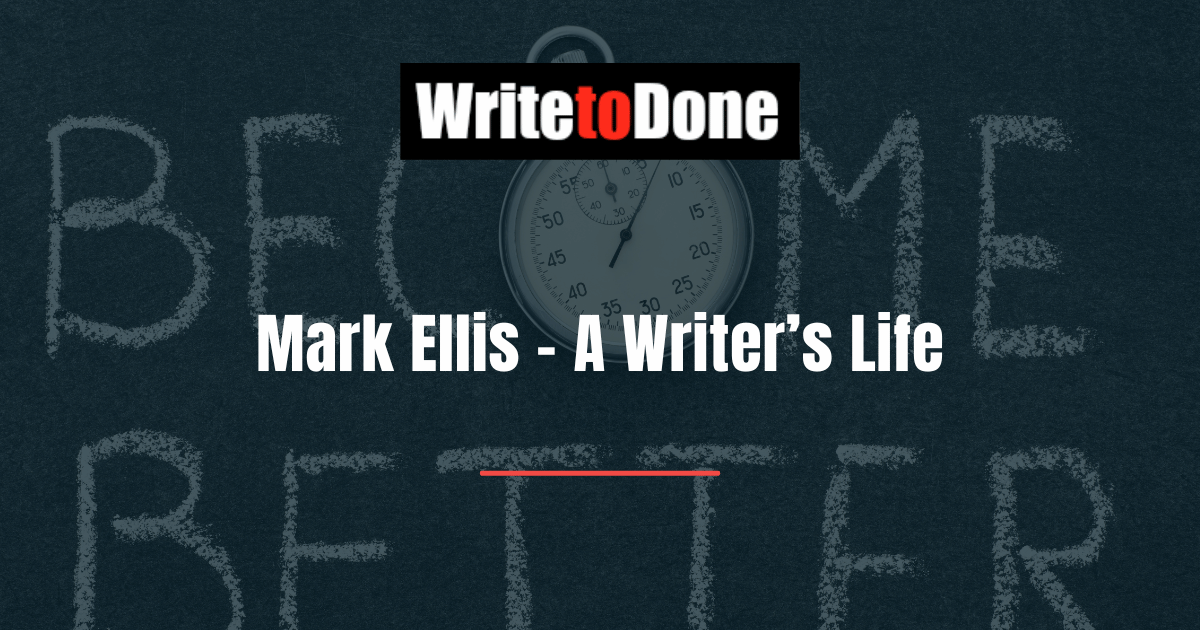Welcome to our new series – A Writer’s Life.
A succession of living writers will reveal how they first started writing, how they got published and something of their daily routine. You’ll be inspired, learn powerful tips and gain a strong sense of the writing life that awaits you.
We’re starting the series with Mark Ellis, creator of the well-known Detective Chief Inspector Frank Merlin of Scotland Yard, star of three books so far. As a former barrister and entrepreneur turned crime writer, read how Mark grasped his passion and created his life as a writer.
Laura Tong -Editor.
I became a published author relatively late in life.
Having qualified in the U.K. as a barrister in the 70s, I practiced law for a short while before joining a merchant bank in London. After a few years at that I went to work as an executive for a large international company before eventually starting my own company with a friend in the early 90s.
The business we had chosen was computer services and our timing was good. We built the company up successfully over a decade, going public on NASDAQ along the way. Eventually we were lucky enough to sell the business to the major American corporation, NCR.
Throughout the many years of my legal and business career I had always retained my childhood ambition of becoming an author. In my school and university years I had written a number of stories and, at one point, half a novel, and had been encouraged by teachers and friends to think that I might have some talent but the pressures of working life allowed me little time to continue.
Once we had sold our business, however, I eagerly grasped the opportunity to take up writing again.
I decided pretty quickly what I wanted to write. I had always been fascinated by World War 2 and in particular the details of how people on the Home Front carried on with their day to day lives while Britain was in such dreadful peril.
I learned from my research as well that there was a crime boom throughout the war years, with reported offenses rising by nearly 60 per cent between 1939 and 1945. Behind this rise were factors like the blackout, the chaos caused by persistent German bombing, the burgeoning black market arising from restrictions like rationing, and others.
It seemed like a great historical setting for a police detective series and so I created Detective Chief Inspector Frank Merlin of Scotland Yard. I decided to write a series about Merlin, following this brave and resourceful officer in his adventures all the way through the war.
So far there are three books in the series. The newly published third Merlin At War, set in June 1941, follows the first, Princes Gate, set in January 1940, and the second, Stalin’s Gold, set in September 1940. I plan to set the fourth Merlin book, which I am currently researching, in December 1941, around the time of the attack on Pearl Harbor.
What have I learned about writing as I have created the Merlin series? Well, when I sat down to write the first book, I really didn’t have a clear idea of what was required. Now, after three books, I have a work routine which suits me and seems to work. The main points of my routine are as follows:
1. I am writing historical fiction as well as crime fiction. I want to make the setting and action of the stories as authentic and accurate as I can. Before I write a word I do several weeks of careful research of the exact time period of the book. It is not just accuracy I get from my research as, so far, the bulk of my plot ideas have also emerged during the process.
2. Once the writing has started I keep up a regular daily routine. I normally write at least five days a week and for at least four hours a day. I don’t have a daily target word count but am unhappy if I don’t manage at least 1500 to 2000 words. My usual hard writing hours are 10am to 2pm. After that I go over my research and ideas for a few more hours. I do not do much redrafting as I go along. I try and get a full first draft on paper after which I may do as many as 20 redrafts of the full manuscript.
3. So far at least, I have never started a book knowing exactly or even roughly how it is going to end. I start out with various plot lines in my head and see where they take me. Just after I am half way through the first draft, I begin to try and work out how to pull everything together and devise my ending.
4. Once the book is published, of course, the modern author’s work is far from done. The book is written but now it must be sold. I am back to being in business! I enjoy book signings, talking about Merlin and World War 2, and meeting readers and am happy to go wherever I am wanted.
I very much enjoy my new career. There is something deeply rewarding about creating a whole new world in one’s head, a world which then begins to have a life of its own.
Now please forgive me, but I must get back to December 1941!
















